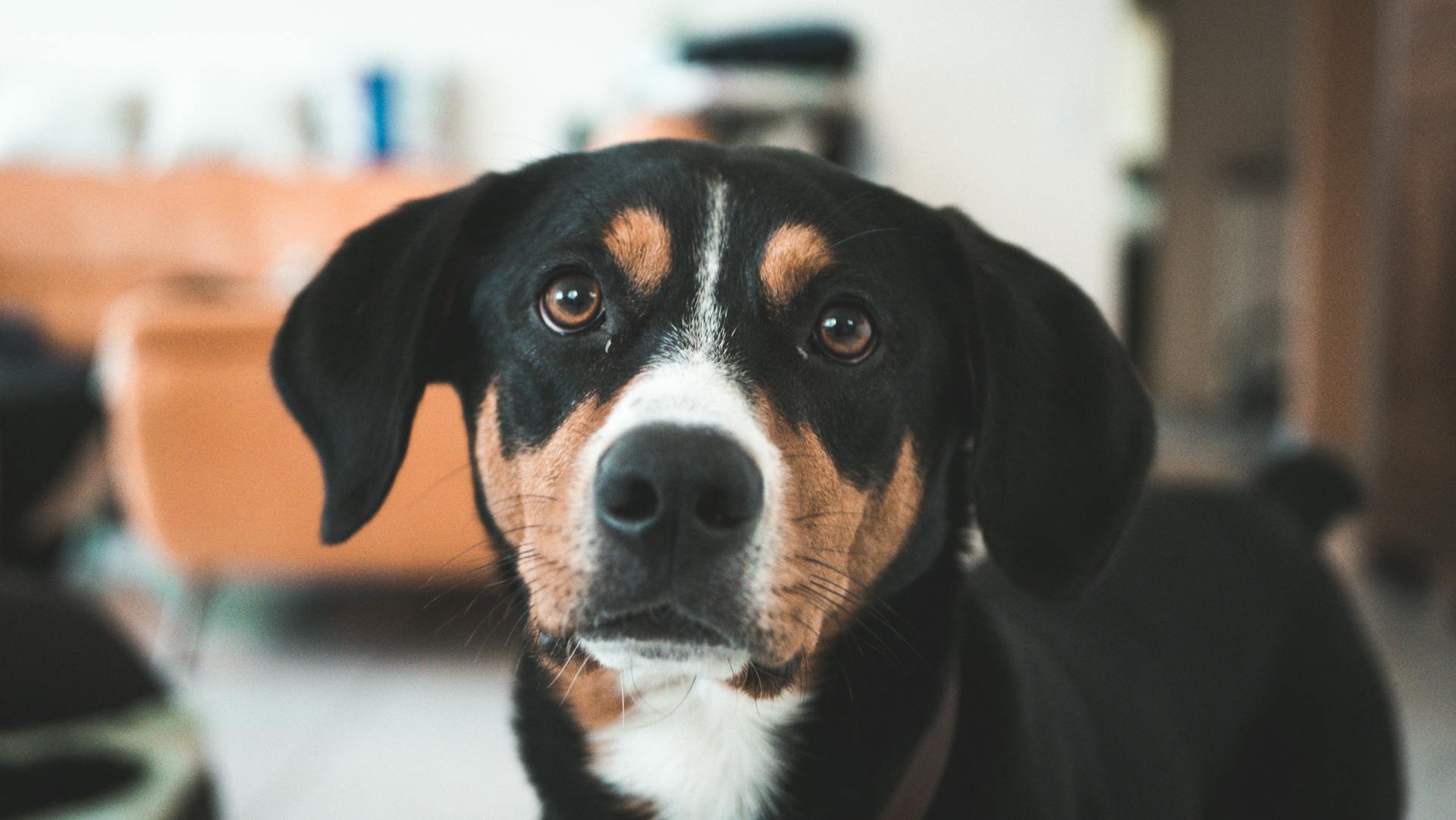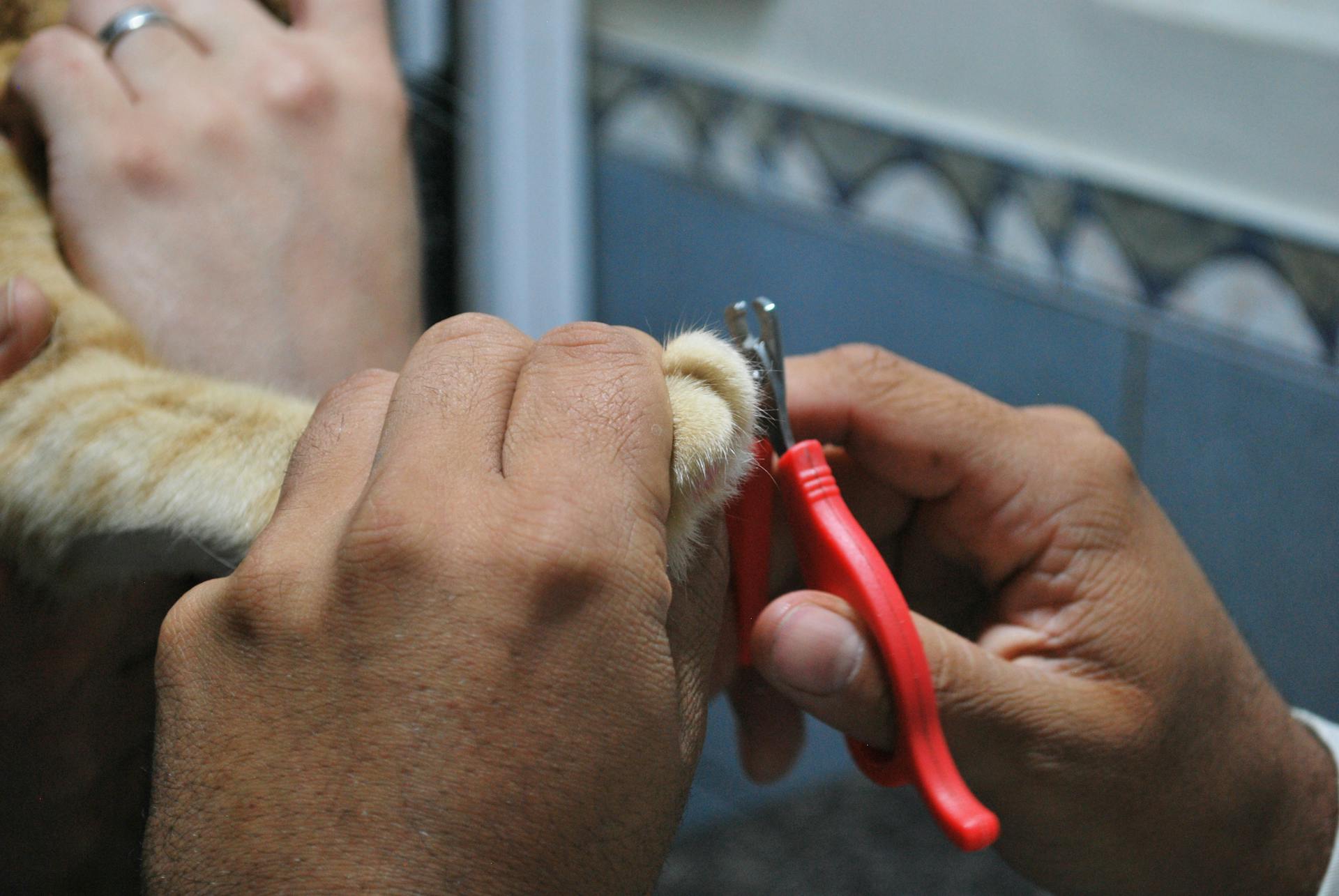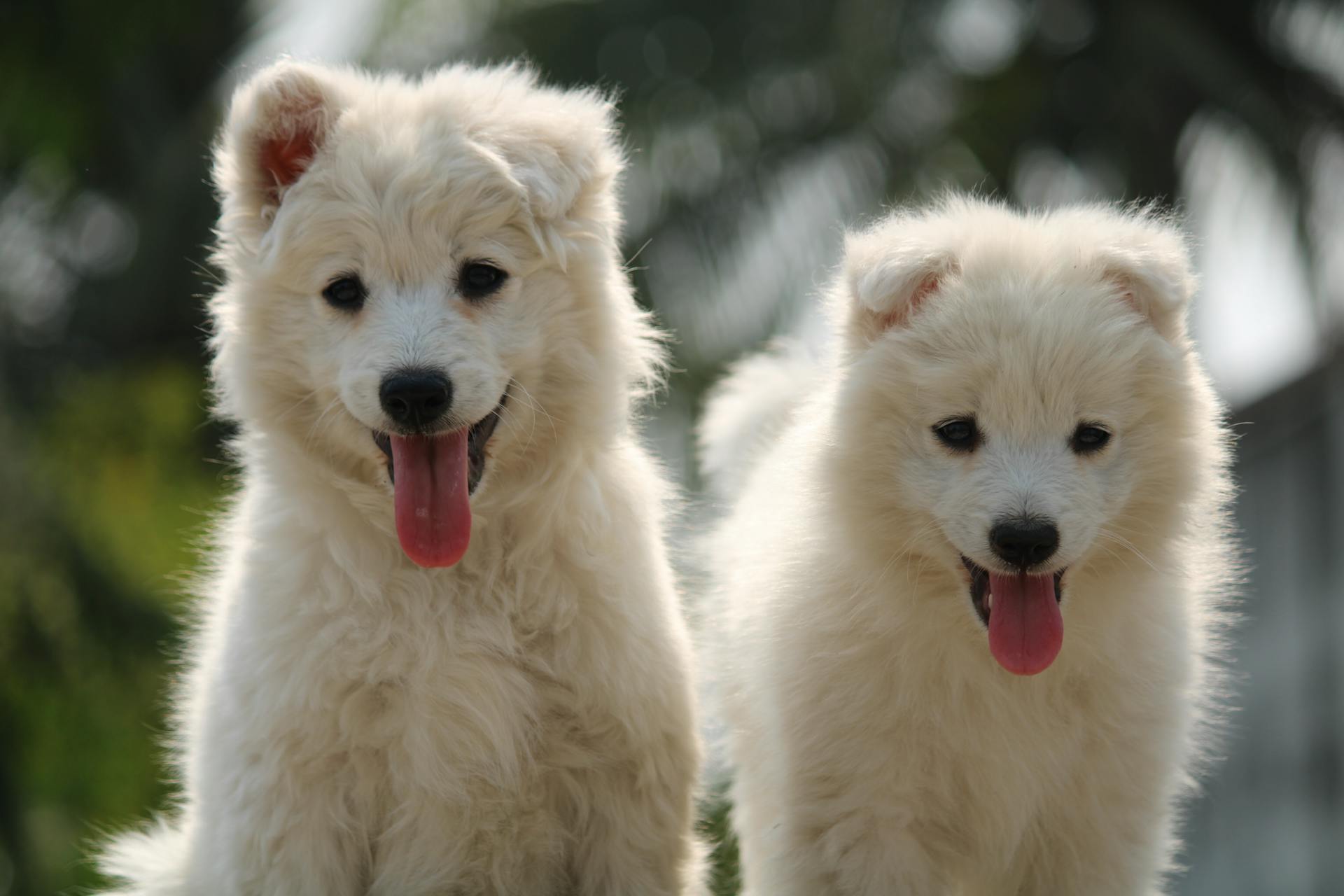
Bordetella kennel cough is a common respiratory infection that affects dogs, especially those that spend time in kennels or around other dogs. It's highly contagious and can be spread through the air when an infected dog coughs or sneezes.
The Bordetella bacteria can survive on surfaces for up to 14 days, making it easy to spread. This means that even if you keep your dog away from other dogs, they can still get infected if they come into contact with contaminated surfaces.
Preventing bordetella kennel cough is key, and one of the best ways to do this is by vaccinating your dog. The Bordetella vaccine is available in two forms: intranasal and injectable.
Readers also liked: Bordetella Vaccine vs Kennel Cough
What Is in
Kennel cough in dogs is a highly contagious respiratory disease that can cause a dry, hacking cough, sounding like a honk or a sharp, puffing cough.
Dogs can develop kennel cough approximately two to 14 days after exposure, often after visiting a groomer, boarding facility, or dog park.
The symptoms of kennel cough can be mild in some dogs, but it can progress to life-threatening pneumonia in others.
Some dogs will act completely normal besides the cough itself, but others may require emergency veterinary care if they're showing signs of pneumonia, including lethargy, loss of appetite, fever, and a greenish-yellow discharge from their nose.
Additional reading: Can Dogs Catch Pneumonia from Humans
Causes and Contributing Factors
Bordetella kennel cough is a common issue in dogs, and understanding its causes and contributing factors can help you take preventive measures.
Bordetella bronchiseptica bacteria is a primary cause of kennel cough in dogs. This bacteria can be spread through respiratory secretions, such as coughing or sneezing, and can also be contracted from infected objects.
Multiple viruses, including canine adenovirus, parainfluenza virus, and canine influenza virus, can also contribute to kennel cough. These viruses can spread quickly among dogs, especially in crowded areas.
Dogs can contract kennel cough in various settings, including animal shelters, boarding kennels, dog daycare facilities, grooming facilities, and dog parks.
Broaden your view: Kennel Cough Bacteria
Here are some of the key causes and contributing factors of bordetella kennel cough:
- Bordetella bronchiseptica bacteria
- Canine adenovirus
- Parainfluenza virus
- Canine influenza virus
- Canine distemper virus
- Canine respiratory corona virus
- Canine reovirus
In addition to these causes, other factors like heartworms, distemper, and lung problems can also lead to coughing in dogs. These conditions can be prevented or treated with proper medication and care.
Diagnosis and Detection
If you suspect your dog might have kennel cough, the first step is to visit your veterinarian. They'll likely recommend calling the clinic before bringing your dog in to minimize the risk of infecting other patients.
Your veterinarian will make a "presumptive" diagnosis of CIRDC by thoroughly examining your dog for signs of illness, ruling out other causes of cough, and asking questions about exposure to other dogs or multiple-dog settings. This is especially helpful if your dog has mild symptoms that will likely improve quickly.
In cases where multiple dogs are affected or your dog's symptoms worsen despite supportive treatment, diagnostic testing is recommended. This involves collecting swab samples from the throat, nose, and/or edges of the eyes and submitting them for lab testing to confirm infection and identify the specific bacteria/viruses involved.
Your veterinarian may also recommend testing if an outbreak is occurring in multiple dogs. This helps to quickly identify the source of the infection and take steps to prevent further spread.
In some cases, blood tests may be recommended in addition to swab samples. This can provide more information about your dog's overall health and help your veterinarian make an accurate diagnosis.
Diagnostic testing is typically not needed to diagnose kennel cough, as identifying the underlying bacteria or virus is not necessary. However, if your veterinarian suspects pneumonia, or if your dog does not respond to supportive care, testing may be recommended.
Symptoms and Duration
Symptoms of kennel cough are quite distinctive. The classic symptom is a persistent, forceful cough that sounds like a goose honk.
Other symptoms can include sneezing, a runny nose, or eye discharge. Some dogs may also show lethargy, loss of appetite, or a low fever.
Here are the common symptoms of kennel cough:
- Strong cough, often with a “honking” sound
- Runny nose
- Sneezing
- Lethargy
- Loss of appetite
- Low fever
Most dogs with kennel cough recover within 1 to 3 weeks, but it can take up to 6 weeks in older dogs or those with other medical conditions.
Symptoms of

Symptoms of kennel cough can be quite distinctive. The classic symptom is a persistent, forceful cough that sounds like a goose honk.
Some dogs may also exhibit other symptoms, including a runny nose, sneezing, or eye discharge. These symptoms can vary from dog to dog, but a strong cough is usually the most obvious sign.
A runny nose is another common symptom of kennel cough. This can be accompanied by sneezing, which can be a sign of post-nasal drip or a slight irritation of the throat.
In addition to a runny nose, some dogs may also experience sneezing, lethargy, loss of appetite, low fever, or a strong cough with a "honking" sound.
Here are some common symptoms of kennel cough:
- Strong cough, often with a “honking” sound
- Runny nose
- Sneezing
- Lethargy
- Loss of appetite
- Low fever
It's worth noting that these symptoms can be similar to those of other conditions, such as canine distemper virus, canine influenza virus, collapsing trachea, bronchitis, asthma, and heart disease.
Recommended read: Canine Distemper Virus
How Long Does It Last?
Most dogs with kennel cough recover completely within 1 to 3 weeks.

Older dogs or those with other medical conditions can take up to 6 weeks to recover.
It's essential to follow up with your veterinarian if your dog doesn't improve within the expected amount of time.
Rapid breathing, not eating, or listlessness in your dog can be signs of more serious conditions, so contact your vet right away if you notice any of these symptoms.
Protecting My Dog from CIRDC
Keeping your dog's vaccines current is the best way to protect them against CIRDC. Vaccines reduce the chance of your dog becoming ill, make them less likely to develop severe disease, and prevent them from spreading the infection to other dogs.
Standard (or "core") canine vaccines are highly effective against some CIRDC-associated viruses and are recommended for all dogs. Your veterinarian will help you decide which vaccines your dog needs to stay healthy.
To further protect your dog, keep them away from toys and food and water bowls used by dogs outside your household. Stay informed about places or geographic regions where CIRDC has been reported, and delay or avoid travel with your dog to those areas.
Here are some common causes of CIRDC:
- Canine parainfluenza virus
- Canine adenovirus type 2
- Canine influenza virus (subtypes H3N2 and H3N8)
- Canine respiratory coronavirus
- Canine herpesvirus-1
- Canine distemper virus
Some of these causes can be prevented with standard vaccines, while others require additional vaccines.
Treatment and Management
If you suspect your dog has kennel cough, keep them away from other animals and contact your veterinarian.
Supportive care is a key part of treatment for kennel cough. This includes rest, nutrition, and hydration, which can help your dog recover from the condition.
Keeping your dog in a well-humidified area can help soothe their airways and reduce coughing. You can also try using a humidifier in their sleeping area.
A cough suppressant may be prescribed by your veterinarian to help reduce the frequency of the cough. This can be especially helpful at night when your dog is trying to sleep.
In some cases, your veterinarian may prescribe antibiotics to prevent secondary bacterial infection. These can help your dog recover more quickly and reduce the risk of complications.
If your dog has developed pneumonia, treatment can involve hospitalization, intravenous fluids, antibiotics, and possibly oxygen therapy.
Here are some tips for managing your dog's recovery:
- Avoid irritants like household cleaners, cigarette smoke, and dust, which can prolong your dog's recovery.
- Switch to a harness instead of a collar and leash, as collars can put extra pressure on the trachea and induce coughing.
- Keep your dog in a quiet, comfortable space where they can rest and recover.
How Does Spread?
Bordetella kennel cough can spread rapidly, particularly in multiple-dog settings. This is because most dogs with CIRDC are contagious before they show signs of illness.
Dogs can catch kennel cough through close or direct contact with infected dogs, such as licking or nuzzling. They can also breathe in cough or sneeze droplets from infected dogs.
The risk of infection is especially high when dogs are in close contact with other infected dogs for long periods of time. This is why kennel cough outbreaks often occur in places where dogs congregate, such as boarding kennels, dog daycare facilities, and dog shows.
Some CIRDC-associated organisms can survive in the environment for weeks, making it challenging to control the spread of infection. This is why it's essential to take precautions to prevent the spread of kennel cough.
Here are some ways kennel cough can spread:
- Airborne droplets
- Direct contact (touching noses)
- Contaminated surfaces (including water or food bowls)
To prevent the spread of kennel cough, it's crucial to keep your dog away from other dogs until fully recovered. You should also keep your dog away from toys and food and water bowls used by dogs outside your household.
A fresh viewpoint: Can Kennel Cough Resolve on Its Own
Vaccination and Prevention
There are three forms of vaccine for kennel cough, including one that's injected, one that's a nasal mist, and one that's given by mouth.
The intranasal and oral kennel cough vaccinations are typically given to dogs once a year, but sometimes are recommended every 6 months for dogs at high risk for kennel cough.
Fully vaccinated dogs can still get kennel cough, but vaccination may help keep your pet protected.
Dogs that have a brachycephalic face with a smushed-looking nose are strongly encouraged to get the vaccine, as they are more likely to struggle with recovering from respiratory diseases.
Some pet parents may elect to skip vaccinating for kennel cough because their pet never has exposure to other dogs, but the vaccine comes in many forms, including an oral liquid that is very safe with little side effects.
To help minimize the risk of your pet getting kennel cough, vaccination against one of the common causes (Bordetella bronchiseptica) is generally recommended.
Asking about vaccine requirements when looking for grooming facilities, daycare facilities, or general doggy play date partners can ensure the dogs your pup will be in contact with are also vaccinated.
Worth a look: Skin Relief for Dogs with Allergies
Sources
- https://www.avma.org/resources-tools/pet-owners/petcare/canine-infectious-respiratory-disease-complex-kennel-cough
- https://www.webmd.com/pets/dogs/kennel-cough-in-dogs
- https://www.akc.org/expert-advice/health/kennel-cough-in-dogs/
- https://www.americanhumane.org/fact-sheet/kennel-cough/
- https://www.petmd.com/dog/conditions/respiratory/kennel-cough-dogs-symptoms-and-treatments
Featured Images: pexels.com


